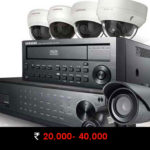Q: How much does a home theater typically cost?
A. The cost of a home theater can vary depending on many factors, such as:
- Budget: Home theaters can range from a few thousand rupees for a basic setup to over a lakh for a high-end system. Typically, a dedicated mini theater can be build at a cost of 4 lakh to 25 lakhs. It depends on the size of the room, Number of seating, type of audio system like 5.1 or 7.1 brand of audio video equipments, interior design, quality of acoustic materials etc.
- Components and features: The biggest cost factors are the audio/visual equipment and any room modifications (such as seating, soundproofing). Premium features like Dolby Atmos sound systems, and luxury seating will significantly increase the cost.
Q: How long will a home theater project take?
A. The timeline for a home theater project can vary depending on several factors:
- Type of the Setup: A basic setup with minimal modifications to your space will naturally be quicker than a complex system.
- Product Availability: Lead times for equipment or custom components can impact the project duration.
Here’s a general time frame based on complexity:
- Basic Setup (1-2 weeks): This involves mounting a TV, setting up a soundbar, and arranging some seating. You could potentially complete this in a weekend if you’re handy.
- Mid-Range Setup (2-4 weeks): This could involve installing a projector screen, running speaker wire, and setting up a surround sound system. Hiring a consultant for this range is a good option for streamlined installation. And we are happy to tell you that we are the best home theater consultants in Kerala.
- Luxury Home Theater (4-8 weeks or more): These projects involve extensive planning, potential construction work for soundproofing or custom seating, and integrating various high-end components. Consultants are highly recommended for such complex setups, as it needs a technical person to install.
Q. What is the ideal room size for a home theater?
A. There’s no ideal room size for a home theater, but rather a range that provides the best experience for sound and viewing.
- A rectangular room with a ratio of width to depth between 1.5:1 and 2.4:1 is ideal. This helps avoid resonances or unwanted sound reflections that can distort the audio experience.
- The ideal viewing distance for a home theater depends on the size of your screen. A common rule of thumb is to sit 1.5 to 2.5 times the diagonal screen size away from the screen for optimal viewing. This ensures you can take in the entire picture without straining your eyes.
For full information regarding this, contact us, as we are the best home theater consultants in Kerala.
Q. How far away should I sit from the screen?
A. The ideal distance to sit from your home theater screen depends on the size of the screen itself. Here are some common methods to determine the optimal viewing distance:
- 1.5: This provides a more immersive viewing experience, allowing you to see the entire picture without excessive head movement.
- 2.5: This offers a more comfortable viewing distance, particularly suitable for larger screens or for viewers who prefer not to sit too close.
- For high-resolution screens (4K and above), you can sit closer without noticing individual pixels.
- Action movies or games might benefit from a more immersive closer distance, while documentaries or dramas might be more enjoyable from a slightly further distance.
- The most important factor is finding a distance that feels comfortable for your eyes and neck. Home theater consultants in Kerala are the best persons to reach out to know full and updated information regarding this.
Q. What type of seating is best for a home theater?
A. Here’s a breakdown of popular options and things to keep in mind:
- Home Theater Recliners: These are the classic choice, offering plush comfort with reclining backs, footrests, and cup holders. Some models have features like power adjustments, heat and massage, and built-in storage.
- Media Chairs: These club chairs or armchairs are designed for comfort with plush cushions and reclining mechanisms. They might not offer the same level of adjustability as recliners but can be a stylish alternative.
- Theater Seats: Replicating cinema seating, these offer a more upright position with headrests and cup holders. They can be individual chairs or come in rows for a truly cinematic feel.
- Sectional Sofas: A versatile option, sectionals can be configured to fit your space and seating needs. Look for ones with good lumbar support and consider adding ottomans for footrests.
Contact Home theater experts in Kerala, Trivandrum. We are the best experts and have more than 25 years of experience in this field.
Q: What services do home theater consultants typically offer?
A. Home theater consultants can provide a range of services to help you design, install, and optimize your home theater system. Here’s a breakdown it:
Pre-Installation Services:
- Consultation: This is the initial discussion where the consultant gets to know your needs, budget, desired features, and the space you have available.
- Design and Planning: Based on the consultation, the consultant will create a detailed design plan for your home theater. This might involve layout diagrams, equipment recommendations, and acoustic treatment considerations.
- Product Selection: The consultant will help you choose the right audio/visual equipment (projector/TV, speakers, receiver, etc.) that fits your budget and performance requirements. They’ll consider compatibility, brand reputation, and features that best suit your needs.
Installation Services:
- Equipment Installation: The consultant or their team will handle the physical installation of your home theater system. This includes mounting the projector or TV, running speaker wire, setting up the receiver and other components, and ensuring proper calibration.
- Calibration: A crucial step for optimal audio and visual performance, calibration involves fine-tuning the speakers, subwoofer, and display to your specific room acoustics. The consultant will use specialized equipment and software to achieve the best possible sound and picture quality.
Q. How can I make my home theater child-proof?
A. Creating a home theater experience that’s both enjoyable and safe for children requires some clever childproofing strategies. Here are some tips to keep your equipment and little ones protected:
- Consider a media console with lockable doors: Invest in a media console with lockable doors or cabinets specifically designed to house home theater equipment. This keeps everything out of sight and out of reach of small hands.
- Lock away components: Store media players, receivers, and other equipment in cabinets or locked drawers. This prevents curious hands from accessing buttons or ports that could damage the equipment or change settings. Home theater consultants in Trivandrum will be the best team to tell you everything about this, so contact us any time, we will be happy to guide you.
- Mount equipment securely: Wall-mount your TV or projector screen to prevent them from being pulled over or toppled by curious climbers. Use appropriate mounting hardware and ensure it’s securely attached to the wall studs.
- Speaker placement: Position speakers strategically, preferably mounted on the wall at a height out of reach of children. Floor-standing speakers can be secured with furniture straps or tethers to prevent them from tipping over.
- Subwoofer safety: Place the subwoofer in a corner or a designated spot away from play areas. You can also consider using a subwoofer enclosure for an extra layer of protection.
- As much as possible, hide speaker wires and power cords behind walls, baseboards, or inside wiremold channels. This prevents tripping hazards and keeps them out of reach of curious toddlers.
- Remote control holder: Designate a specific, out-of-reach location for the remote control. This could be a wall-mounted holder or a high shelf.
- Consider a universal remote with parental controls: A universal remote with parental controls allows you to restrict access to certain features or channels, preventing unwanted adjustments to settings.
Conclusion
Creating a home theater requires planning and consideration. From projector vs. TV to the number of speakers, the right choices depend on your budget and desired experience. Acoustics play a crucial role, so soundproofing and treatment might be necessary.
We just discussed some important points regarding home theater installation. Home theater installation is a technical work and you need a technical team for that. Contact us for all these installations regarding things as we have the pride to be one of the best Home theater consultants in Trivandrum.
Keep safety in mind, especially if you have children, by childproofing furniture, electronics, and wires. With careful planning, you can create an immersive and enjoyable home theater experience for everyone.








